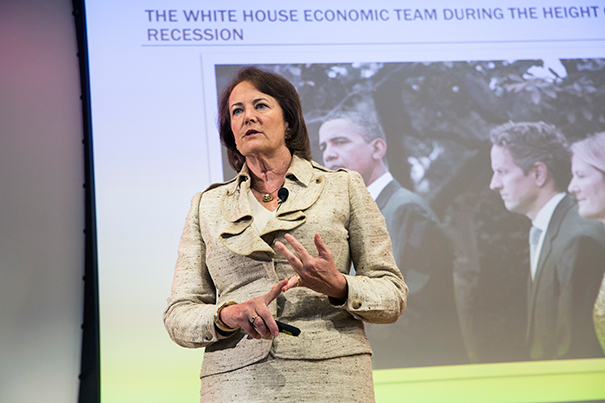
Karen Mills, a senior fellow at Harvard Business School, spoke of the need for “small businesses to have a voice in a community” as part of her Ed Portal lecture.
Jon Chase/Harvard Staff Photographer
For small businesses, a good guide is a good start
Mills draws from comprehensive experience in Ed Portal talk
Addressing an audience of community members and small business owners at the Harvard Ed Portal last Thursday, Karen Mills ’75, M.B.A. ’77, a senior fellow at Harvard Business School and former vice chair of the Harvard Board of Overseers, said that an “ecosystem” is vital to driving economic development in a community.
An ecosystem is “an innovation district, an accelerator, a cluster, a way to get small businesses together in a community,” Mills said. “It’s creating ways for small businesses to have a voice in a community.”
Mills spoke about innovation and small business growth as part of her Ed Portal lecture, drawing from her experience as administrator of the U.S. Small Business Administration (SBA) and a member of President Obama’s cabinet from 2009 to 2013.
At the SBA, Mills managed a federal loan guarantee portfolio of more than $100 billion. When she stepped into her role, small businesses were facing “an incredible crisis.” Amid the wider recession, banks had tightened lending rules and pulled credit lines, leading small businesses to close in record numbers.
The consequences were widespread, as half of U.S. workers own or are employed by small businesses. And the sector is still struggling.
“Out of 28 million small business owners in the U.S., 23 million are sole proprietors, meaning they have no employees,” Mills said. “Of these, 15 million are making their living from that sole proprietorship. And a majority of U.S. small businesses in Allston, in Brighton, and all across the country are Main Street businesses. We’re talking about restaurants, dry cleaners, car repair operations: the fabric of our daily lives.”
While banks have largely recovered, many community banks have closed, and Main Street businesses often have trouble accessing the capital they need.
“There’s a credit gap in the small-dollar loans, those under $250,000,” Mills said. “That’s the size loan that 70 percent of small businesses want. In fact, almost 40 percent of small businesses want loans for even less than that: under $50,000.”
With fewer banking options, many small business owners have turned to online lenders for credit. “There’s more of these lenders on the market every day,” she said. “You can go online and get approval in a few minutes or a few hours, and the money is in your account in just a few days.”
The downside? Such loans often come with extremely high annual percentage rates.
Ultimately, small businesses must know when to borrow, how much to borrow, and the right time frame for a loan, Mills stressed, pointing to the importance of getting good advice.
“The single best thing you can do is get a counselor to work with you and help you make these decisions,” she said, noting that SCORE mentors are available at the iLab, and encouraging attendees to consider the Ed Portal’s workforce business development classes. “We want to make sure small business owners have what they need to succeed and help grow this community so it can be strong and prosper in the future.”
Anthony D’Isidoro, president of the Allston Brighton Community Development Corporation (CDC), said that the talk reflected the growing relationship between Harvard and the Allston-Brighton community.
“Harvard has been a great partner with the Allston Brighton CDC,” he said. “I try to inform the community about events, and as a community, the Ed Portal is one of the best things Harvard has done in our evolving relationship. It’s a tremendous resource. People in the community need to know that it’s here and the opportunities that are available to them, from school programs through workforce development.”




